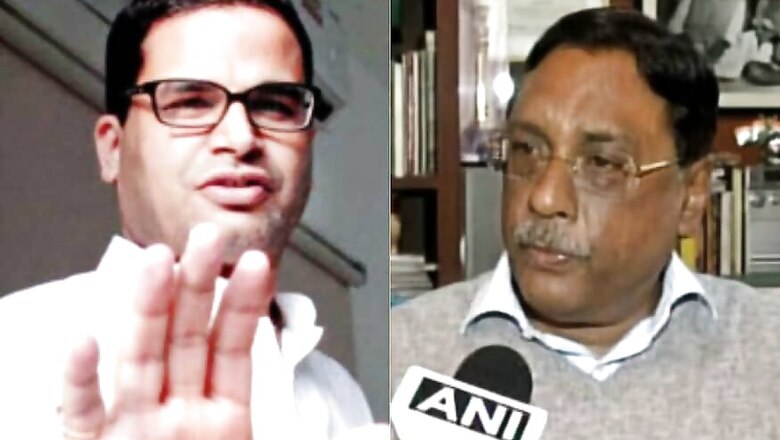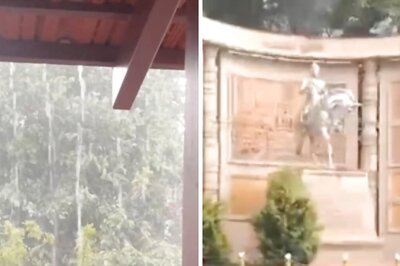
views
Former diplomat Pavan Varma and election strategist Prashant Kishor had successfully run the ‘war room’ of Nitish Kumar during the 2015 Bihar assembly elections and installed him as chief minister of the Grand Alliance comprising Rashtriya Janata Dal (RJD) and Janata Dal (United).
Five years after, they are waging a ‘war’ against Kumar, berating him over his support to the Citizenship Amendment Act (CAA) and seeking his categorical stand on the National Population Register (NPR) and National Register for Citizens (NRC), besides JD(U)’s poll alliance with BJP for the ensuing Delhi assembly elections.
Varma has sought ‘ideological clarity’ from Kumar over CAA, NPR and NRC in view of the ongoing agitation against them, while Kishor has been venting his displeasure over the party’s stand on the contentious law.
The matter raised by Varma also pertains to the personal views of Kumar about Rashtriya Swayamsevak Sangh (RSS), describing the saffron outfit as ‘most dangerous’ for the country. Varma claimed that Kumar, in private conversations, had derided the ‘divisive’ agenda of the BJP and wanted the democratic and socialist forces to regroup against the saffron brigade.
What had embarrassed Kumar the most amid the raging controversy within the JD(U) was the caustic criticism made by leader of opposition in the Bihar assembly Tejashwi Prasad Yadav over the chief minister’s viewpoint on the RSS. “When I used to sit next to him in the assembly, he used to tell me that RSS people are dangerous,” Tejashwi said during a debate in the state assembly convened recently for a day to ratify the SC and ST Bill passed by Parliament.
Their outbursts for the past over a month have evoked sharp reaction from Kumar, who said Varma was free to go anywhere he wanted. “He should have raised issues, if any, on party platform instead of releasing it publicly. Would I ever go public with what he has said to me in private?” Kumar asked.
Though Kumar did not name Prashant Kishor, it is certainly a warning to him also to look for another political platform. Party insiders claimed that Varma and Kishor might be expelled from the party soon for indulging in ‘anti-party activities’ and ‘weakening’ it before the Delhi polls.
It is an irony that Kumar has been facing scathing attack from Kishor and Varma, whom he had banked upon the most, ignoring even trusted lieutenants like Rajiv Ranjan Singh alias Lallan Singh and RCP Singh.
Both Varma and Kishor were inducted into the Janata Dal (United) with great fanfare in a bid to give the party an image-makeover and project the hitherto regional party as a national party.
Varma, a career diplomat and writer, had taken premature retirement from the Indian Foreign Service to join Kumar in 2013. Since then, he has served as culture adviser to the Bihar chief minister. Varma was also given a two-year stint in Rajya Sabha and later made party’s general secretary and national spokesperson.
Two years later in 2015, Varma was instrumental in roping in poll strategist Kishor for JD(U) campaign in the crucial assembly elections in 2015 when Kumar had broken the alliance with the BJP and joined hands with the Rashtriya Janata Dal (RJD).
As an election strategist, Kishor had played an important role in bringing the JD(U) and RJD under the banner of Mahagathbandhan (Grand Alliance) during the 2015 assembly polls and pitched for Kumar’s victory in the polls.
In a major makeover in his campaign strategy to connect with the people, a hi-tech ‘war room’ was set up on the advice of Kishor at the 7, Circular Road official bungalow where Kumar lived after quitting the post of the chief minister, owning moral responsibility for the party’s defeat in the 2014 Lok Sabha elections.
Besides Kishor, the then Rajya Sabha MP Pavan Varma was also among those in charge of the ‘war room’ with five party spokespersons in attendance. Kishor, who worked with the party top brass, had spread the party’s message through different campaigns like Har Ghar Dastak, Bihari NDA and seven-point Nitish Nischay to reach out to the voters.
When Kumar left the Grand Alliance and returned to the NDA in 2017, Kishor was inducted into the JD(U) in September 2018 and made party’s national vice-president with the task of negotiating seat-sharing with the BJP before the crucial 2019 Lok Sabha polls. Kishor’s elevation in party’s ranks had raised eyebrows but sulking party leaders grudgingly accepted it.
Initially, Kumar seems to have used Kishor and Varma to rein in the BJP over CAA though officially, the JD(U) supported the bill in both Houses of Parliament. However, the situation changed after the Jharkhand polls wherein the NDA constituents lost to the JMM-Congress-RJD alliance ostensibly because they fought the polls separately.
Consequently, the JD(U) changed its stand on NPR and CAA and decided to fight the Delhi assembly polls in alliance with the BJP. While the BJP is contesting from 67 of 70 assembly seats, the JD(U) is contesting from two seats. The Lok Janshakti Party (LJP) — the third NDA partner — is contesting from one seat.
The Jharkhand debacle seems to have forced the JD(U) and other NDA allies to change their strategy and fight the polls together to avoid wastage of votes. At the national executive meeting held in June last year, the JD(U) had announced that it will not be a part of the BJP-led NDA outside Bihar and contest assembly polls in states on its own.
The decision was taken in a bid to expand the presence of the party and to attain the status of a national-recognised party by 2020. As part of this strategy, the JD(U) fought the assembly elections in Jharkhand separately but could not open its account.
It was due to the objections raised by Varma and Kishor to alliance with the BJP in Delhi that they have been excluded from the list of JD(U)’s star campaigners in the upcoming Delhi polls. They had stressed that BJP’s ally Akali Dal has taken a stand on the contentious issues like CAA and NRC and decided not to go with the BJP in the ensuing Delhi polls.
(The author is a senior journalist. Views expressed are personal)




















Comments
0 comment